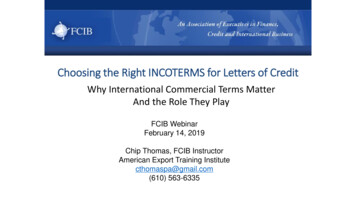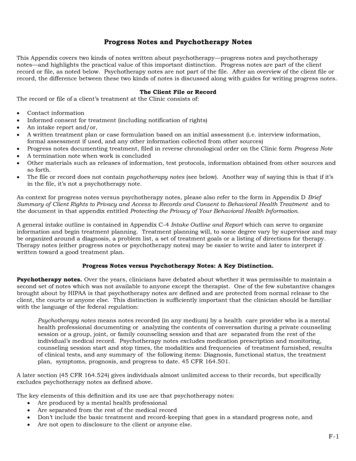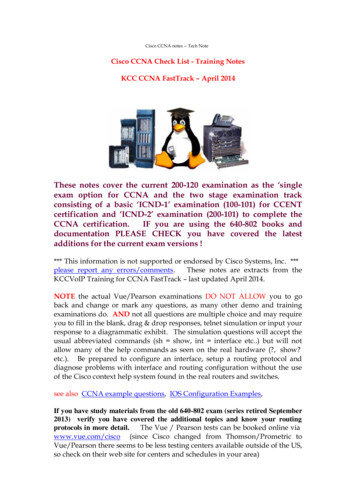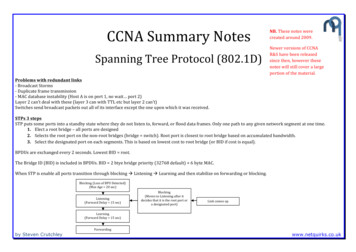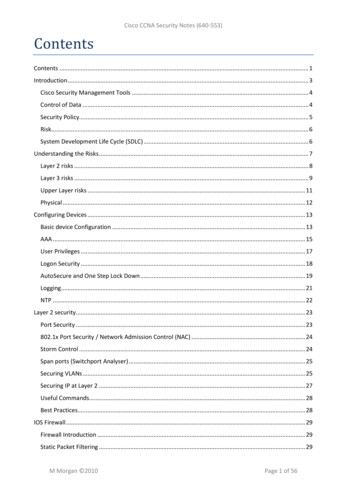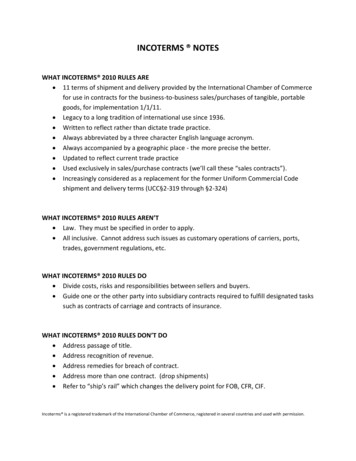
Transcription
INCOTERMS NOTESWHAT INCOTERMS 2010 RULES ARE11 terms of shipment and delivery provided by the International Chamber of Commercefor use in contracts for the business-to-business sales/purchases of tangible, portablegoods, for implementation 1/1/11.Legacy to a long tradition of international use since 1936.Written to reflect rather than dictate trade practice.Always abbreviated by a three character English language acronym.Always accompanied by a geographic place - the more precise the better.Updated to reflect current trade practiceUsed exclusively in sales/purchase contracts (we’ll call these “sales contracts”).Increasingly considered as a replacement for the former Uniform Commercial Codeshipment and delivery terms (UCC§2-319 through §2-324)WHAT INCOTERMS 2010 RULES AREN’TLaw. They must be specified in order to apply.All inclusive. Cannot address such issues as customary operations of carriers, ports,trades, government regulations, etc.WHAT INCOTERMS 2010 RULES DODivide costs, risks and responsibilities between sellers and buyers.Guide one or the other party into subsidiary contracts required to fulfill designated taskssuch as contracts of carriage and contracts of insurance.WHAT INCOTERMS 2010 RULES DON’T DOAddress passage of title.Address recognition of revenue.Address remedies for breach of contract.Address more than one contract. (drop shipments)Refer to “ship’s rail” which changes the delivery point for FOB, CFR, CIF.Incoterms is a registered trademark of the International Chamber of Commerce, registered in several countries and used with permission.
DEFINITIONSDelivery: indicates where the risk of loss passes from seller to buyer.Shipment contract - a type of sales/purchase contract under which the seller’s responsibilityends when the contract goods have been handed over to a carrier (i.e., the seller delivers byshipping). EXW, FCA, FAS, FOB, CPT, CIP, CFR and CIF Incoterms rules are used in shipmentcontracts.Arrival contract: - a type of sales/purchase contract under which the seller’s responsibility endswhen the goods have arrived at the agreed place (i.e., the seller delivers when goods arrive).DAT, DAP and DDP Incoterms rules are used in arrival contracts.Liner terms : - carrier loads and unloads vessel (used with waterborne transport).EX WORKS (EXW) NAMED PLACE (place where the shipment originates - usually the seller’spremises)Breakdown:Seller: have goods available when promised and packaged to the extent known or agreed.Buyer: everything else (pre-carriage, export clearance, main carriage, import clearance, oncarriage)FREE CARRIER (FCA) NAMED PLACE (either place where shipment originates - usually theseller’s premises - or another place on the seller’s side.)Breakdown:A) When accompanied by the place where the shipment originatesSeller: have goods available when promised, packaged to the extent known or agreed,load collecting vehicle, export clearance.Buyer: everything else (pre-carriage, main carriage, import clearance, on-carriage)B) When accompanied by another place on the seller’s sideSeller: have goods available when promised, packaged to the extent known or agreed,load delivering vehicle, pre-carriage, export clearance.Buyer: everything else (unload delivering vehicle, main carriage, import clearance, oncarriage)
CARRIAGE PAID TO NAMED PLACE (CPT) (on the buyer’s side)Breakdown:Seller: deliver the goods appropriately packaged to the carrier for transportation to the namedplace of destination and pay all transport costs thereto. (The seller delivers at the first carrierunless specified otherwise in the sales contract.), export clearance.Buyer: unloading (?), import clearance, on carriage (?)CARRIAGE AND INSURANCE PAID TO (CIP) NAMED PLACE (on the buyer’s side)Breakdown:Seller: as with CPT except seller must also provide at least minimum cover insurance in such amanner that the buyer can claim directly from the insurerBuyer: unloading (?), import clearance, on carriage (?)DELIVERED AT TERMINAL (DAT) NAMED PLACE (terminal on buyer’s side)Breakdown:Seller: export clearance, deliver the goods appropriately packaged and unloaded at the nameddestination terminal and pay all transport costs thereto.Buyer: import clearance, on carriageDELIVERED AT PLACE (DAP) NAMED PLACE (on the buyer’s side)Breakdown:Seller: export clearance, deliver the goods appropriately packaged at the named destinationand pay all transport costs thereto.Buyer: unloading (?), import clearance, on carriage (?)DELIVERED DUTY PAID (DDP) NAMED PLACE (on the buyer’s side)Breakdown:Seller: export clearance, deliver the goods appropriately packaged and cleared for import at thenamed destination and pay all transport costs thereto.Buyer: unloading (?), on carriage (?)
FREE ALONGSIDE SHIP (FAS) NAMED PLACE (alongside a vessel at port on the seller’s side)Breakdown:Seller delivers goods appropriately export packed alongside the buyer-designated vessel at theport on the seller’s side, export clearance.Buyer: everything else (vessel loading, main carriage, import clearance, on carriage)FREE ON BOARD (FOB) NAMED PLACE (loaded on a vessel at a port on the seller’s side)Breakdown:Seller delivers goods appropriately export packed on board the buyer-designated vessel at theport on the seller’s side, export clearance.Buyer: everything else (main carriage, import clearance, on carriage)COST AND FREIGHT (CFR) NAMED PLACE (a port on the buyer’s side)Breakdown:Seller delivers goods appropriately export packed on board the seller-designated vessel at theport on the seller’s side and pays transportation costs to the agreed port on the buyer’s side,export clearance.Buyer: everything else (vessel unloading (?) import clearance, on carriage)COST INSURANCE AND FREIGHT (CIF) NAMED PLACE (a port on the buyer’s side)Breakdown:Seller: as with CFR except seller must also provide at least minimum cover insurance in such amanner that the buyer can claim directly from the insurerBuyer: everything else (vessel unloading (?) import clearance, on carriage)
WHAT THE OFFICIAL UCC SHIPMENT AND DELIVERY TERMS ARESix terms of shipment and delivery for sales of tangible goods (plus one documentdescription) as formerly found in Parts 2-319 through 2-324 of the Official UniformCommercial Codeembedded to great extent in the sales contract laws of each common law statelast revised in 1962available only in Englishextensively used only by Americans mainly for domestic tradeabbreviated by English acronyms and wordsused either with accompanied geographic places or default placesdeleted from the Official UCC as obsolete in 2004extremely complicated to correctly uselikely to be deleted from law on a state-by-state basis at some future time.WHAT THE OFFICIAL UCC SHIPMENT AND DELIVERY TERMS AREN’Tspecific. The F.O.B. term has been expanded to include all means of transportation aswell as shipment and delivery contracts and freight collect and freight prepaidtransportation.self contained. There are many references and sub-references to other Official UCCarticles which may or may not have also been deleted.well understood. Many times, F.O.B. is used merely as a pricing term to indicate freightpayment without regard to its default provisions affecting responsibility, title andpayment.understood internationally.WHAT THE OFFICIAL UCC SHIPMENT AND DELIVERY TERMS DOdivide costs, risks and responsibilities, (and ownership and payment timing forcontracts otherwise silent) between sellers and buyers, often through defaultprovisions and/or by cross references to other Official UCC parts.guide one or the other contracting party into subsidiary contracts necessary to fulfilldesignated tasks, such as contracts of carriage and insuranceprovide handy shorthand by reducing pages of responsibilities to three characters andsometimes a word and a specified or default place.increase the potential for seller-buyer misunderstanding through numerous crossreferences and default situations.
FROM F.O.B. (OFFICIAL UCC §2-319) TO INCOTERMS 2010 RULESF.O.B. Origin, Freight Collect:Breakdown: Seller hands over goods at the place where shipment originates, often the seller’spremises.Delivery point: where shipment originates.Incoterms match-up: Ex Works (EXW)F.O.B. Origin Car or other Vehicle, Freight Collect:Breakdown: Seller hands over goods at the place where shipment originates, often the seller’spremises, and loads the collecting vehicle.Delivery point: where shipment originates.Incoterms match-up: Free Carrier (FCA) origin pointF.O.B. Origin, Freight PrepaidBreakdown: Seller loads the first carrier at the place where the shipment originates, often theseller’s premises, and pays the freight to the agreed place, often the buyer’s premises.Delivery point: where shipment originates, after loading.Incoterms match-ups: either Carriage Paid To (CPT) or Carriage and Insurance Paid (CIP) WithCIP the parties should agree that the seller ill handle any Inland Marine insurance claims in thebuyer’s behalf.F.O.B. Destination, Freight CollectBreakdown: Seller loads the collecting vehicle at the place where the shipment originates, oftenthe seller’s premises, but remains responsible for the condition of the goods until arrival at theagreed place.Delivery point: where shipment arrives at the agreed destination, often the buyer’s premises.Incoterms match-up: NONE. There is no Incoterms rule that extends the seller’s risk for thecondition of the goods to the destination without also making it responsible for contracting fortransportation to get them there.FOB Destination, Freight PrepaidBreakdown: Seller loads the first carrier at the place where the shipment originates, often theseller’s premises, and pays the freight to the agreed destination, often the buyer’s premises.Delivery point: where shipment arrives at the agreed destination, often the buyer’s premises.Incoterms match-up: Delivered At Place (DAP) or if the agreed place is a terminal, DeliveredAt Terminal (DAT).
F.O.B. VesselBreakdown: Seller is responsible for all cost and for the condition of the goods until they areloaded on board the vessel.Delivery point: vessel loaded at embarkation port.Incoterms match-up: Free On Board (FOB)FROM F.A.S. (OFFICIAL UCC §2-319) TO INCOTERMS 2010 RULESBreakdown: Seller delivers the goods alongside the buyer-appointed vessel and is responsiblefor their condition and all costs until they get there.Delivery point: alongside the buyer-appointed vessel at the embarkation port.Incoterms match-ups: Free Alongside Ship (FAS)FROM C.I.F. and C. & F. (OFFICIAL UCC §2-320) TO INCOTERMS 2010 RULESBreakdown: Seller remains responsible for the condition of the goods through vessel loading ofthe seller-appointed vessel at the port of embarkation, and pays the freight cost and insuranceto the named destination port.Delivery point: vessel loaded at embarkation portIncoterms match-up: Cost, Insurance and Freight (CIF) or Cost and Freight (CFR)FROM C.I.F. AND C. & F. NET LANDED WEIGHTS (OFFICIAL UCC §2-321) TO INCOTERMS 2010RULESBreakdown: Same as C.I.F. and C. & F. except that the price due the seller is based on thearrived quantity or weight, etc. which is not determinable at time of shipment. However, theseller is not responsible should the shipment be lost or damaged in main carriage, only for“ordinary deterioration, shrinkage, and the like.”Incoterms match-up: NONE. Incoterms rules focus on the seller’s delivery obligation.FROM DELIVERY EX SHIP (OFFICIAL UCC §2-322) TO INCOTERMS 2010 RULESBreakdown: Seller is responsible for all costs and the condition of the goods until they have leftthe ship’s tackle or are otherwise properly unloaded on the quay at the destination port.Delivery point: on the quay next to the vessel at the destination port.Incoterms match-up: Delivered At Terminal (DAT)
FROM UCC BILL OF LADING (UCC §2-323) TO INCOTERMS 2010 RULESBreakdown: Describes the form a bill of lading must take for shipments “overseas” (or domesticvessel and even air shipments that are akin to “international deep water commerce”).Incoterms match-up: NONE. No Incoterms rule defines a document.FROM UCC “NO ARRIVAL – NO SALE” (UCC §2-324) TO INCOTERMS 2010 RULESBreakdown: Provision that the seller avoided the sales contract if the goods are not delivered tothe buyer through no fault of the seller (UCC §2.615). UCC 2-613 Casualty to Identified Goodsrelieves the buyer from the obligation to pay if the goods are not delivered and if the goods arepartially lost, or damaged so as to be non-conforming, the buyer may either terminate thecontract or accept the goods with reduced pricing.Incoterms match-up: NONE. Incoterms rules focus on the seller’s delivery obligation.
specific. The F.O.B. term has been expanded to include all means of transportation as well as shipment and delivery contracts and freight collect and freight prepaid transportation. self contained. There are many references and sub-references to other Official UCC articles which may or may not have also been deleted. well understood.


